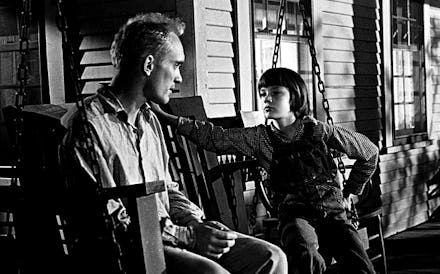When I Started Going By the Name Scout, I Had No Idea This Would Happen

It was a Sunday in 1996 when a man told me I reminded him of Scout in Harper Lee's To Kill a Mockingbird. I'd been chasing water bugs and was covered in mud. My overalls hung off of me and my short hair stuck to my neck. A curious child, I implored my mother to buy me the Book on Tape.
I liked Scout. She was like me: adventurous, curious, confident, intelligent and compassionate. Above all she believed people, despite their evils, are inherently good.
When we moved to California the next year, I introduced myself as Scout. My family thought it was a phase, like the time my brother went by Atreyu for six weeks after watching The NeverEnding Story. I debated going back to my birth name; I felt like I'd abandoned it. But something stopped me. I liked Scout too much. I'd come to enjoy the question that followed handshakes: "Scout, like in To Kill a Mockingbird?" Sometimes people would forget the novel's name but not Scout. Something about her character stuck with them. And no one ever forgot my name.
For 18 years, Scout and I were frozen in the 300-odd pages of To Kill a Mockingbird. We were safe in the arms of a one-hit wonder shrouded in mystery, by an author who receded like her character Boo Radley. We were forever the little girl that everyone admired.
Fast forward: Then on Feb. 3, I got a phone call from my mother. "There's a new book," she said. "It's about Scout as an adult, your age, and it's coming out in July." July is my birthday month. It all felt too neat. I scoured the Internet. I bristled at theories that Tonja Carter, Lee's attorney, was manipulating the 88-year-old author. Eventually the speculation faded and the literary universe gave the book's release a nod of approval. So I did too.
Over the next few months, people would ask me about the book, as if I were an expert. I was honest with them. I was afraid. Afraid of what would happen to Lee's reputation if the book were bad. Afraid her first novel's place in our classrooms and hearts would be disturbed. Afraid Scout would be different.
Last Friday morning, the Guardian released the first chapter of Go Set a Watchman. I consumed it before breakfast. Reading it was emotional. At the first "she," it felt like a dead relative had come back to life. I wilted when I learned Jem, Scout's brother, was dead. By the time I finished, I was trying to rub the goosebumps off my legs. It was so strange to have her back, however different. Scout, whose real name is Jean-Louise, seems to have assumed her given name in the new novel. I felt like the child now, refusing to abandon "Scout" in favor of a more grown-up moniker, the one on my birth certificate: Sarah Dunham MacEachron.
That same morning, I read Michiko Kakutani's review of the book in the New York Times. Kakutani is notoriously tough. A critic for the New York Times since 1983, she made David Foster Wallace cry once. Kakutani's review is, in my opinion, one-sided. She focuses on Atticus Finch and his newfound "dark side." The just, crusading lawyer we will forever envision as Gregory Peck, who played him in the 1962 film adaptation, has been replaced by a bent, racist old man. Both Kakutani and other reviewers acknowledge the novel is about Scout confronting the realities of adulthood: disillusionment, isolation, commitment and the jarring realization that our parents aren't the people we thought they were when we were waist-high and they could fix anything.
Part of me enjoys the parallels. I, almost 26, have confronted these realities too. In a way, it's more real to see the character I've lived with for so long grow up. But the new novel takes away much of what I've come to love about my name. Scout is no longer a well-preserved example of childhood's morality. I feel somewhat betrayed. A small part of me even resents Lee for letting Scout become someone different.
When I chose the name Scout, it was based on a character I assumed would never change. I do not want or plan to give up my name, but I am no longer in control of what it means, of who that character is. I suppose it feels like naming a café after the street it's on, only to find out the city has decided to change the street name. Suddenly you're powerless over the significance of the word you've chosen to identify yourself by.
Leonard Ashley, an American writer, scholar and former secretary of the International Linguistic Society, describes the relationship between name and individual in his 1989 book What's in a Name? Names are "scripts for their lives, expressions of the beliefs and expectations of their parents," Ashley writes, "clues to where they fit into society and what their duties are."
When I chose the name Scout, it was based on a character I assumed would never change.
Scout was my guide to where I fit. I am a journalist. What better name than "Scout" for one who devotes her life, in theory, to truth-seeking? Scout implies adventure and curiosity. Whenever I'm afraid to do something, I remind myself of my name and summon the courage to do it (this once led to an ill-advised leap off a waterfall in Brazil). Now no one who meets me will think of the little girl in To Kill a Mockingbird, they'll think of Jean-Louise.
Maybe that's OK. Maybe this is a way for Lee or life to tell me that change and evolution of identity are inevitable, best embrace it. Or maybe the name is what I make it, no more significant than the T-shirt I'm wearing. Perhaps a scout by any other name will still wear overalls.